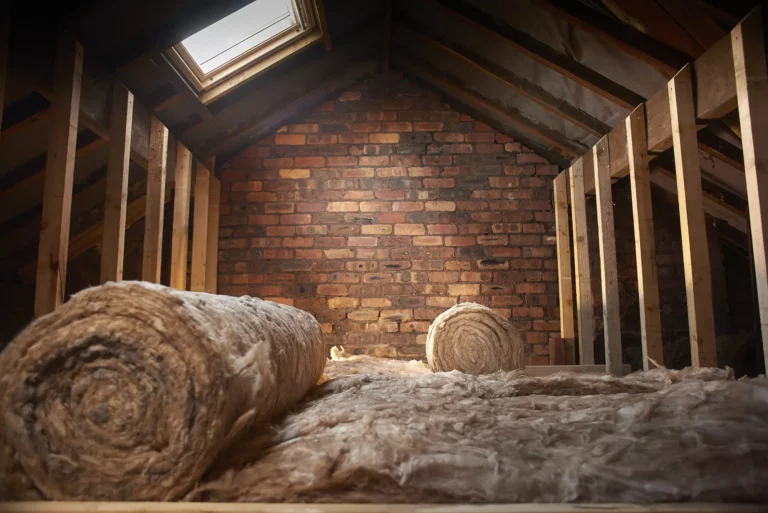
Is There Asbestos in Your Loft? What to Know Before Insulation Removal
If your home was built before the 1990s, there’s a chance that your loft insulation could contain asbestos—a hidden danger
When planning for home insulation upgrades, blown-in attic insulation costs are essential. Blown-in attic insulation has various advantages, including increased energy efficiency, improved indoor comfort, and lower utility expenses.
On the other hand, understanding the costs of this insulation technology is critical for making informed judgments and budgeting correctly. By investigating the cost-influencing elements, comparing material options, and factoring in labor costs, homeowners may thoroughly grasp expenses and select the most cost-effective solution for their insulation needs.
The introduction of loose insulation materials into the attic area is known as blown-in attic insulation, sometimes known as loose-fill insulation. This kind of insulation employs fiberglass, cellulose, or mineral wool, which are blown or sprayed into the attic with specialized equipment.
As the insulation settles, it forms a barrier that effectively minimizes heat transfer between the living space and the attic.
To calculate the cost of blown-in attic insulation, average material and labor prices must be considered. The following sections provide an overview of the typical expenses.
Blown-in attic insulation can also be expressed as a cost per square foot of attic space. An average 1,000-square-foot attic costs between $1,200 and $2,800. However, this cost can vary depending on the previously listed criteria.
Homeowners may need to remove current blown-in attic insulation for various reasons, including damage, contamination, or renovations. Blowing-in insulation removal can cost between $1 and $3 per square foot. The cost of asbestos removal can be influenced by accessibility, insulation type, and risks such as asbestos.

The cost of putting blown-in attic insulation is determined by the size of your attic and the type of material used. Professional installation costs between $1,500 and $3,000 on average for homeowners. To ensure a proper and effective installation process, engaging experienced and skilled insulation contractors is critical.
Because of its excellent thermal performance and eco-friendliness, blown-in cellulose insulation is popular among homeowners. The cost of blown-in cellulose insulation can range from $1.50 to $4 per square foot, depending on the thickness of the insulation and other parameters discussed previously.
Blown-in cellulose insulation has several advantages. It has a greater R-value than fiberglass insulation, providing better heat resistance. It is also treated with fire-retardant chemicals, improving its safety. Furthermore, blown-in cellulose insulation can effectively cover gaps and voids, resulting in a more airtight and energy-efficient attic.
Because of the numerous variables involved, estimating the Blown-in attic insulation cost can be difficult. You should seek quotes from competent insulation contractors who can examine your attic problems and provide reliable pricing estimates. To offer you a complete analysis of the estimated expenses, they will analyze aspects such as attic size, material type, accessibility, and local labor rates.
The same elements, such as attic size, material type, and labor expenses, impact attic insulation costs. To establish precise pricing based on your specific needs, contact insulation consultants specializing in Attic insulation.
Blown-in attic insulation costs in Canada are significant for homeowners trying to boost energy efficiency and interior comfort. The cost of blown-in attic insulation in Canada can vary based on numerous factors, including the size of the attic, the type of insulation material chosen, the accessibility of the attic, and local labor costs. Additionally, regional variations and market factors might also influence the overall cost.
To receive realistic cost estimates for blown-in attic insulation in Canada, you should engage with insulation professionals who know the local market and can provide accurate prices based on your unique requirements. By understanding the cost variables and getting professional help, homeowners in Canada may make informed decisions and ensure a successful insulation project that maximizes energy savings and long-term advantages.
Blown-in attic insulation cost is critical when improving your home’s energy efficiency and comfort. While the initial investment may appear substantial, the long-term advantages outweigh the cost. The cost of blown-in attic insulation is a prudent investment that pays off over time due to lower energy bills, higher thermal performance, and a more sustainable environment.
Investing in an energy-efficient solution provides homes with increased comfort, reduced energy usage, and a lesser carbon footprint. Join the countless others who have recognized the need for blown-in attic insulation and take the essential measures to improve your house today. Our skilled team at Confirmed Contracting Corp is ready to renovate various services with the highest quality and proficiency.
Yes, blown-in attic insulation saves money in the long term. It aids in reducing energy use, utility bills, and overall home comfort. The original expenditure in insulation installation can be recouped over time through energy savings.
While installing blown-in attic insulation yourself is feasible, it is best to use specialists for the best results. They have the necessary experience, equipment, and understanding to ensure effective installation and optimum insulation performance.
Blown-in attic insulation can endure for decades if properly installed and maintained. However, moisture damage, bug infestations, and physical disruptions can all shorten its lifespan. Regular inspections and maintenance can help ensure its long-term performance.
Yes, blowing-in attic insulation can help with soundproofing by lowering noise transmission. It absorbs sound waves and reduces noise transfer from outside sources, resulting in a calmer indoor environment.
Rebates, incentives, or energy efficiency programs are available in many locations to provide financial incentives for increasing home insulation. Check with your local government or energy provider to see if you are eligible for programs to help offset the blown-in attic insulation cost.

If your home was built before the 1990s, there’s a chance that your loft insulation could contain asbestos—a hidden danger

Canadian winters are no joke, and heating your home efficiently is more important than ever. In 2025, cold climate heat

Your basement plays a huge role in your home’s comfort, energy efficiency, and even air quality—but only if it’s properly
WhatsApp us